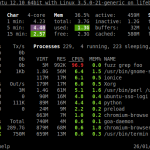Most of this post is based on the information found in the blog of Nicolargo, the author of this tool. Glances is a free software (licensed under LGPL) to monitor your GNU/Linux or BSD operating system from a text interface. Glances uses the library libstatgrab to retrieve information from your system and it is developed […]
Linux shell: understanding Umask with examples
In a GNU/Linux system every file or folder has some access permissions. There are three types of permissions (what allowed to do with a file of any kind, directory included): (r)read access (w)write access (e)execute access There are also other “special” permissions, but for this article the basic permissions will be enough to illustrate how […]
Add security to your ssh daemon with PAM module
In the past I’ve published some info to enhance the security of your ssh server such as 3 easy steps to strengthen your ssh server or how to use SSH for more secure browsing in public networks, today we’ll take a look at the PAM modules of GNU/Linux and in particular the module ssh and […]
How to stop packages from being updated in Linux
Sometimes it’s useful to tell to our GNU/Linux system that we want to keep some packages on Hold or that we do not want to update them , for example you could have added a custom kernel and you don’t want that during an update the standard kernel takes its place, or perhaps you want […]
Manage planned tasks on Linux with the command at
In a former article I’ve talked about the commands cron and crontab that are the standard way to schedule recurring things on a Gnu/Linux system. But sometimes you need to do one thing at a specific date and time for just one time, and for these tasks the best option is to use at, another way […]
